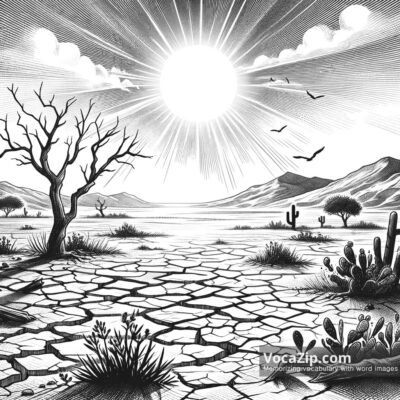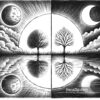drought meaning
drought :
a long dry period, lack of rain
noun
▪ The region is experiencing a severe drought.
▪ The region is experiencing a severe dry period.
▪ Farmers are struggling due to the ongoing drought.
▪ Farmers are struggling because of the ongoing lack of rain.
paraphrasing
▪ dry spell – a temporary period without rain
▪ arid period – a long, dry time
▪ water shortage – not enough water
▪ severe dryness – extreme lack of rain

Pronunciation
drought [draʊt]
The word is pronounced as 'drowt', rhyming with 'shout'.
Common phrases and grammar about drought
drought - Common meaning
noun
a long dry period, lack of rain
Part of Speech Changes for "drought"
▪ drought-resistant (adjective) – able to survive with little rain
▪ drought-stricken (adjective) – suffering from drought
▪ drought-proof (adjective) – protected against drought
Common Expressions with "drought"
▪ severe drought – a very bad drought
▪ prolonged drought – a long-lasting drought
▪ experience drought – go through a drought
▪ face drought – deal with a drought
Important examples of drought in TOEIC
Vocabulary examples from the TOEIC test
In TOEIC vocabulary questions, drought is used to discuss lack of water or rain in contexts like agriculture or environment.
Example of a confusing word: draught (a current of air)
Grammar examples from the TOEIC test
Drought is used as a noun in TOEIC grammar questions, often paired with adjectives or nouns related to climate.
drought
Idioms and fixed expressions in TOEIC
severe drought
an extreme lack of rain, used when discussing bad weather conditions.
face a drought
to deal with a long period without rain
Differences between similar words and drought
drought
,
dry spell
differences
Drought refers to a long-term lack of rain, while dry spell is usually temporary.
drought
,
arid period
differences
Drought refers to a long-standing lack of rain, while arid period describes extremely dry conditions often due to climate.
Words with the same origin as drought
The origin of drought
The word 'drought' comes from Old English 'drūgath,' meaning dryness.
Word structure
The word is composed of root 'drought' with no prefix or suffix.
Words with the same origin
The word's root is 'drought' itself. There are no influential words with the same root beyond 'drought.'
Please select an image in the quiz
Previous post and next post


proportion
1876
part, share
noun ┃
verb ┃
Views 2






